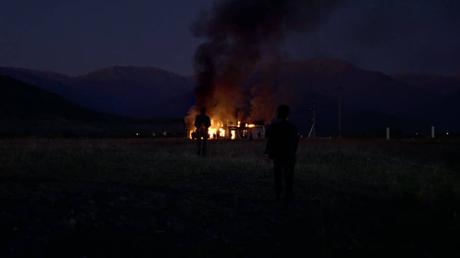Beginning starts with flame that burns down a Jehovah’s Witness community’s Kingdom Hall in a small, provincial town in Georgia. It’s a result of a coordinated attack by a religious extremist group—members of the vast majority who claim to have been disturbed by the minority’s religious activity. Amidst the horizontal conflict, Yana (Ia Sukhitashvili), wife of the community leader (Rati Oneli), finds herself slipping deeper in an existential crisis engulfing her marital and parental duties as well. She helplessly watches her life crumbles from the inside as she tries to make sense of her desires and repeatedly punishes herself each time she has the thoughts. Each punishment feels more severe than the last; before long, the film concludes with dust and that’s where Beginning‘s thought-provoking discourse begins.
Related Post: Review: Quo vadis, Aida? (2020)
Déa Kulumbegashvili’s Beginning (known as Dasatskisi in its native country, Georgia) is that kind of film where the real story only commences in the last few minutes of it. The whole narrative, which the director co-writes with Oneli, who also stars in the film, seeks to unravel every chained event—however mundane it is—up to the point that sets everything in motion. In other words, the whole story determines to make sense how the flaming beginning leads to the dusty end, which apparently is an actual story of its own. Beginning‘s narrative streaming chronologically, however, is in the audience’s favor; it helps us to avoid judging Yana’s eventual collapse and, instead, sympathize with her before finally attempting to rationalize her decisions.

Yana, as a character, isn’t a standout figure. Kulumbegashvili presents her as yet a real human, a young Georgian woman who, as many generations of women before her, is confined to a role in the societal structure. She, like fellow women in her society, tries to accept the fact that her existence is relegated to simply become an extra in someone else’s life. The unique thing about Yana’s situation, however, is her role as a community leader’s wife. She gave up her dream as an aspiring actress to marry her eventual husband and, for that, she has also converted into the faith her husband holds dear. While her husband fights his own battle to ensure the perpetuity of his parish amidst threats from oppressive majority, she fights her own—accepting the consequences of her conversion by living in isolation and alienation. Meanwhile, her own dream has died out and she’s left with no dream to chase for the rest of her life.
Related Post: Review: The Devil All the Time (2020)
The movie takes a darker turn when Alex (Kakha Kintsurashvili), a man who claims to be a detective from Tbilisi, the capital city, arrives to investigate the attack. His identity is shrouded with suspicions. He can be a fraud or a member of extremist group tasked to bring Yara’s family down for all we know; but, the story never goes any step further to clarify it. One sure thing is, his arrival disrupts balance in Yara’s life. In a movie that often overindulge in observing the protagonist’s mundane, monotonous life—often in long, static shots (the picture-perfect shot where Yara lies on the grass where at least three-minute long with barely movements happen on screen), Alex’s arrival lets off a little explosion with an unfair punishment for Yara. The punishment here is not literal; it’s like a proverbial consequence that, in religious views, sometimes blames the victim mercilessly. Kulumbegashvili leads the audiences to gaze deep into Yara’s eyes and asks her what has gone wrong and where it went wrong.
With Yara’s impending collapse, Beginning poignantly invites audiences to view it from the bigger picture. It’s an open complaint to society that, oftentimes, voluntarily defends faith body, such as religions, at whatever cost, but neglects parts of its apparatus who silently demand nothing but emancipation. This take doesn’t specifically point finger at one faith body, but rather in general sense. What happens to Yara can simply happen to anyone in the world and, still, the society traps in a tunnel vision. Kulumbegashvili’s audacity to portray her story with religious symbolism makes the irony tastes even bitter.

